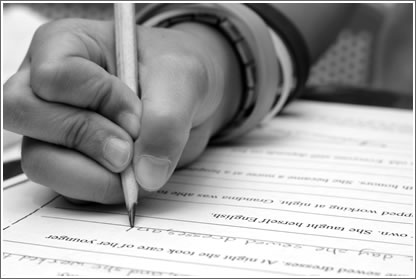
Right before the exam:
- Review summaries and outlines rather than trying to cram at the last minute.
- Make sure you’ve packed everything you need to take to the exam, including pens, colored pencils, and calculator.
- Avoid contact with anyone who might cause you stress.
- Arrive a few minutes early to the exam
Read the entire test first:
- Confirm that you have the whole exam.
- Note point distributions and special instructions.
Plan and apportion your time:
- Allocate the amount of time you spend on a question based on the credit you’ll receive for answering it correctly.
- Answer easy questions first and then move to harder ones.
- Mark any question in the margin that you need to come back to.
Problem-solving sections:
- Highlight, circle, or otherwise indicate what your final answer is, but don’t obliterate any work that you’ve done. It may be the source of partial credit.
- Make diagrams and graphs big and easy to read.
- If you get stuck, make a note to yourself in the margin about what you need to do and come back to the problem later.
- If you’re worried that your answer is wrong, explain the process by which you arrived at that answer. This can be a good source of partial credit.
Essay sections:
- Underline key terms in the questions.
- Make sure that your essay does what the instructions call for (common verbs in instructions are: analyze, trace, explain, discuss, compare, contrast).
- Write an outline at the beginning of your answer or in the margins. This will help you structure your response and may be a source of partial credit if you run out of time.
- Answer every part of the question.
- Provide textual examples, references, data, graphs, etc.
Multiple-choice sections:
- Don’t over-interpret questions.
- Read every answer.
- Eliminate answers that you know to be wrong or that are highly unlikely.
- Trust your first instincts and change an answer only if you actually remember the correct one.
Short answer and identification sections:
- Be clear and precise.
- Cite significance of a thing, person, or place being identified.
- Define key terms.
- Don’t spend too much time on any one question.
If you get stuck...
- Mark that question in the margin and come back to it later.
- Answer what you do know first. This might help you think of more information.
- Write down what you do know. It may help you remember more.
Taken from Princeton University